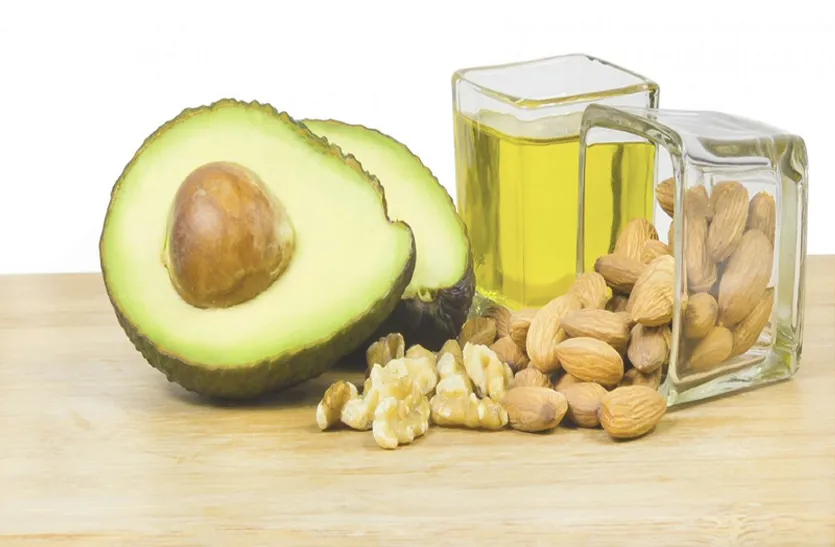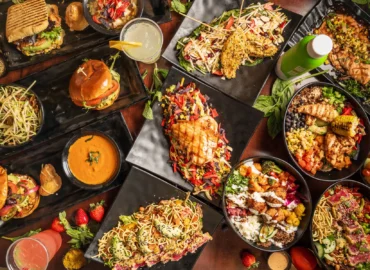Underrated Nutrient – Fat
Myths and Facts about Dietary Fats
Myth 1
Consuming fats will make you fat…
Food that we eat has varied levels of nutrients in it. Man needs adequate nutrients to thrive, grow and live an active life. Nutrients are divided majorly in two forms:
Macronutrients, micronutrients
There are three major macronutriens present in food:
Carbohydrates
Proteins
Fats
1 g of Carbohydrates gives you 4 kcal
1 g of Protein gives you 4 kcal
1 g of Fat gives you 9 kcal
Consuming carbohydrates, proteins and fats in adequate quantities will result in good fitness. Overconsumption of any of the above nutrients will result in deposition of fats in body and excess of boyweight. Consumption of fats in range of 10 – 30% of total calories is recommended.
Myth 2
Fat means oils and ghee…
There are two kinds of fats present in our food. These are Visible fats and Invisible fats. Visible fats are oil, cheese, butter, ghee, cream, vanaspati.
Invisible fats are not immediately noticeable . These are present in foods such as baked goods, peanut butter, processed foods, deep fried foods, chips, egg yolk, salad dressings, etc.
Myth 3
We don’t need to consume fats at all in the diet?
Fats has many important functions in the body.
- Gives you energy
- Keep your body warm
- Build cells
- Protect your organs
- Help your body absorb vitamins from foods
- Produce hormones that help your body work properly
Totally fat deprived diet is not advisable. Though one should restrict fat intake to less than 30 % of their total calorie intake.
Myth 4
All fats are unhealthy…
There are three kinds of fats. The difference between the fats lies in their chemical structure.
1.Saturated fats :
Diet rich in saturated fats can drive up total cholesterol, which increases the risk for heart diseases.
You’ll find saturated fats in food like :
- Ghee
- Red meat
- Whole milk dairy products like milk,cheese,ice cream
- Butter
- Eggs
- Palm and coconut oils
On an average a person should not consume more than 10 g of saturated fats per day.
Most of the trans fats are product of industrial process . Companies add hydrogen to liquid vegetable oils to make them solid at room temperature. This helps food to last longer and gives satisfying taste and texture. Also refrying vegetable oils produces trans fatty acids.
Also one might find trans fats in these foods:
- French fries and other fried foods
- Cakes, pastries, cookies, donuts and other baked foods
- Margarines
- Butter
Though trans fats might taste good , their consumption increses LDL cholesterol. Our dietary intake of trans fats should not increase 0.1% of total caloric intake. If an individual continues to have more transfats in the diet, it is detrimental to heart health.
3.Unsaturated fatty acids:
Unsaturated fats comes mainly from nuts, vegetables and fish. They are liquid at room temperature.
Unsaturated fats come in two forms:
Monounsaturated fats
They are found in :
-Olive oil, Canola oil and Peanut oils
-Avacados
-Almonds, hazelnuts, pecans and the nuts.
Polyunsaturated fats (PUFA)
- Flaxseed , corn, soyabean and sunflower oil
- Walnuts
- Flaxseeds
- Fatty fishes
There are two types of PUFAs
Omega 3 and omega 6 fats
Consumption of PUFA present in vegetable present particularly in vegetable oils not only act as a source of essential fatty acids but help in control of blood cholesterol.
Ideal ratio in which these fats should be consumed : MUFA:PUFA:SFA – 1.2 : 1 :0.8
Myth 5
All oils are same…
Not all oils are same.
There are different kinds of fats in different oils .
Groundnut oil, olive oil, canola oil is rich in monounsaturated fats(MUFA)
Sunflower oil, safflower oil is rich in polyunsaturated fatty acids(PUFA) omega-6.
Mustard oil ,flaxseed oil is rich in polyunsaturated (PUFA)omega -3 fatty acids.
Ghee, coconut oil, vanaspati are forms of saturated fatty acids.
Consuming variety of oils is recommended rather than sticking to only one type of oil in cooking.
Myth 6
Having more oils will increase cholesterol …
Oils from plant sources do not contain cholesterol. So increase in cholesterol content is not directly related to consumption of oils. Infact having omega 6 or omega 3 fats will help reduce cholesterol.
Myth 7
Oil used in deep frying can be used again and again…
Ideally oil used for deep frying should not be used again. Frying at high temperatures produces transfats and this oil causes toxicity in the body. But practically throwing away the leftover oil is not possible, so atleast the oil should be storeed in an airtight container and used within 2-3 days.
Myth 8
Refined oils are the best…
Ideally oil used for deep frying should not be used again. Frying at high temperatures produces transfats and this oil causes toxicity in the body. But practically throwing away the leftover oil is not possible, so atleast the oil should be storeed in an airtight container and used within 2-3 days.








No Comments